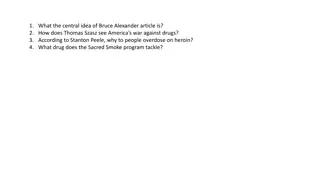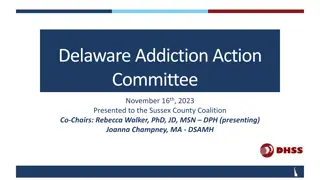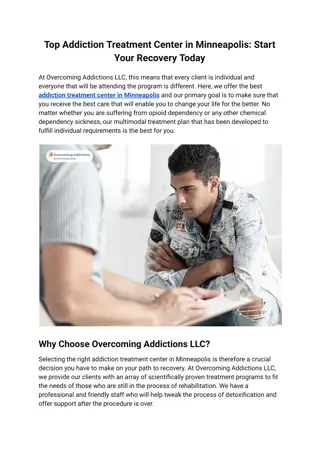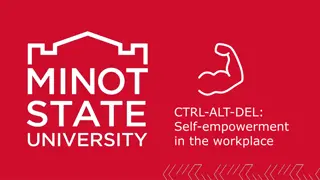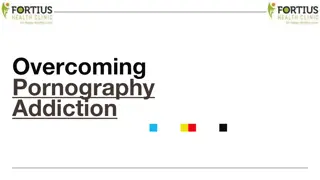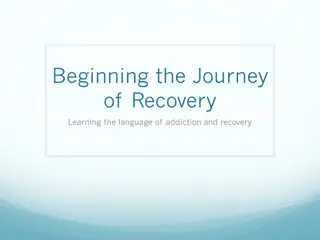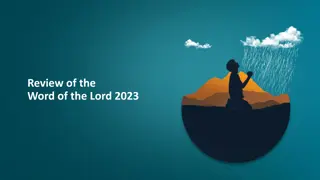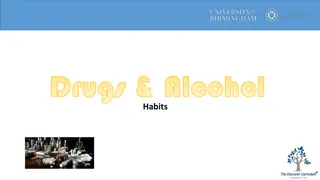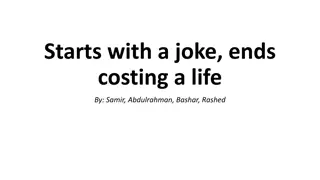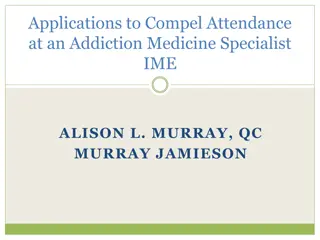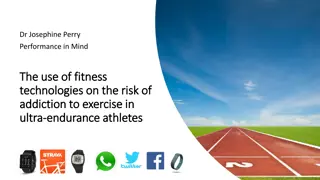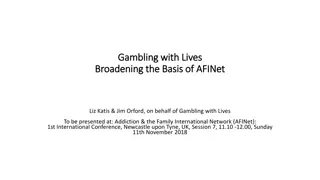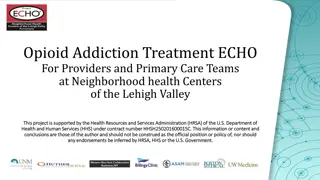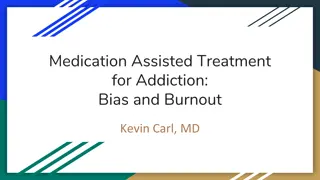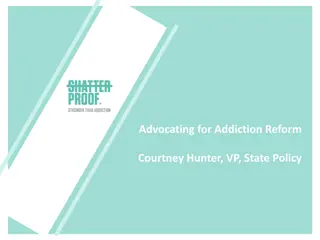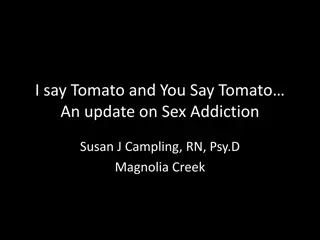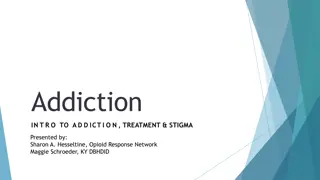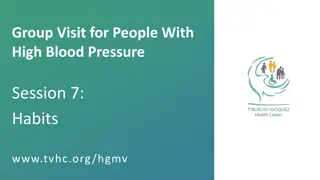Understanding Addiction and Habits
Addiction is a complex topic that involves understanding the stages, behaviors, tolerance, withdrawal, and reasons behind drug use. Explore the link between habits and drug use and the difficulty in breaking habits. Learn about the physiological and psychological aspects of addiction, as well as the potential harm in trying drugs.
Download Presentation

Please find below an Image/Link to download the presentation.
The content on the website is provided AS IS for your information and personal use only. It may not be sold, licensed, or shared on other websites without obtaining consent from the author.If you encounter any issues during the download, it is possible that the publisher has removed the file from their server.
You are allowed to download the files provided on this website for personal or commercial use, subject to the condition that they are used lawfully. All files are the property of their respective owners.
The content on the website is provided AS IS for your information and personal use only. It may not be sold, licensed, or shared on other websites without obtaining consent from the author.
E N D
Presentation Transcript
Addiction Notice Understanding Addiction
Define and differentiate addiction and chemical dependency Discuss the stages of addiction Compare the stages of addiction and the associated behaviors Define tolerance and withdrawal and identify withdrawal symptoms Identify several reasons some teenagers consider drug use and list alternative solutions Objectives 2
Turn to workbooks pg. 15 Kick a Habit Copy the two sentences without dotting your i s or crossing your t s. Allow yourself 30 seconds to complete.
dotting i s crossing t s Was this difficult to accomplish? You are used to crossing your t s and dotting your i s. You ve been doing this since you learned to write. You do it without even thinking about it. THIS IS A HABIT. 4
What is a habit? A behavior that has become so much a part of your life that you don t even stop to think about it anymore.
DRUG USE CAN BE HABITUAL TOO While the initial decision to use a drug is voluntary, regular drug use can become so much a part of someone s life that using the drug becomes as automatic as crossing t s and dotting i s
Do you think you would be able to stop crossing your t s and dotting your i s if I told you to? It s not impossible to break a habit, but it can be difficult.
What does addictive mean? A person can be physiologically addicted meaning the body needs the drug to operate normally, and a person can be psychologically dependent meaning they are hooked on a feeling. Addictive It s even harder to stop using drugs because drugs are not only habit forming, but they can also be addictive as well.
So whats the harm in trying a drug just one time? Do you think someone who starts using a drug expects to become addicted? Addiction develops in stages, and the user is often unaware of its progression until its too late. Chances are the first time will not be the last time.
Stages of Addiction Stage 1: Experimental Use The user s first-time experience typically occurs in a social setting, like a party, where the drug is available. The user at this stage might be curious about the effects of the drug and try it on impulse, just this one time. The user doesn t expect to become addicted to the drug. Stage 2: Pattern Use At this stage, the user doesn t purchase drugs and doesn t plan to use them regularly but will use drugs if they are available. The user begins a pattern of casual use, typically in social settings. While the user won t experience withdrawal symptoms yet, the user develops a tolerance to the substance. What does it mean to have a tolerance? The user will begin to need more and more of the drug to produce the same effect.
Stage 3: Problem Use At this stage of addiction, the user buys drugs and plans when and where to use them. Drug use has been going on for some time now, and the drug begins to run the user s life. How would drugs run someone s life? The user in this stage will experience withdrawal symptoms if they try to quit at this point. Withdrawal is the period of time when the addicted user begins to experience uncomfortable symptoms from not taking the drug. Withdrawal makes it difficult to quit. Stage 4: Addiction At this stage, the drive to find and use the drug is all that matters, despite the consequences. The cravings are so strong the user feels compelled to keep using the drug just to feel normal. The body sends a signal to the brain equivalent to the signal sent when a person is hungry. The drug becomes as important as food for survival. Users in this stage sometimes turn to risky behaviors, like stealing, to get money to feed the addiction. Stages of Addiction Continued
Addiction follows a course of progressive stages, but these stages progress at different rates for different people. Someusers might stay at one stage for a long time, while others might go quickly from Stage 1 to Experimental Use Pattern Use Addiction Problem Use Stage 4.
Pg. 15 Henry s Addiction Read the various accounts from Henry s friends describing Henry s addiction. For each account, write down the stage of addiction Henry is in on the line provided.
The reality is that addiction can happen to anyone who tries a drug. Addiction is difficult to overcome, so it s just easier to never start in the first place. No one plans to become hooked on a drug thinking addiction won t happen to them.
Open Read over the list of common pressures teens often experience. Look at the six sets of healthy activities and identify the most fitting set of alternatives for each of the common pressures. For example: the first one says, to feel older. Which set of healthy activities would be useful to manage this pressure? - Set C workbooks to pg. 16 ResilientMe Remember most teens do not use drugs to cope with life s pressures. The more you are able to overcome challenges, the more resilient you become. You will learn you can bounce back from difficult situations and be ready to take on new ones.
Please complete Kahoot! When finished with all 10 lessons.


